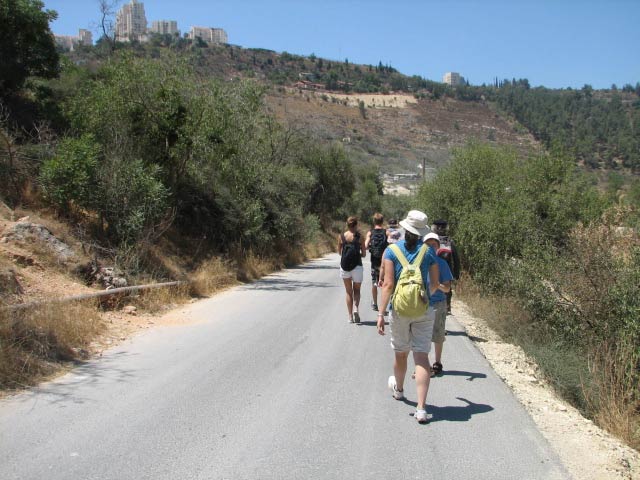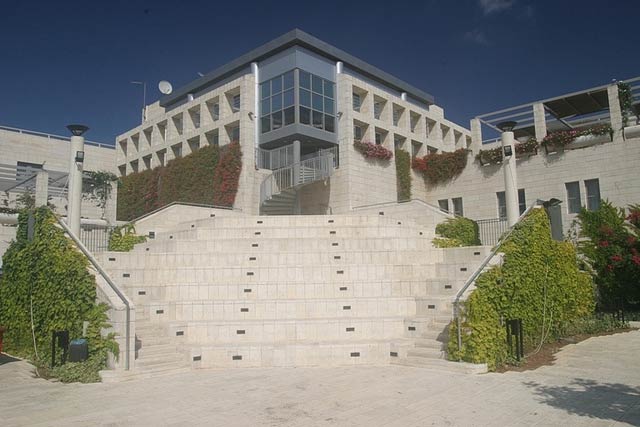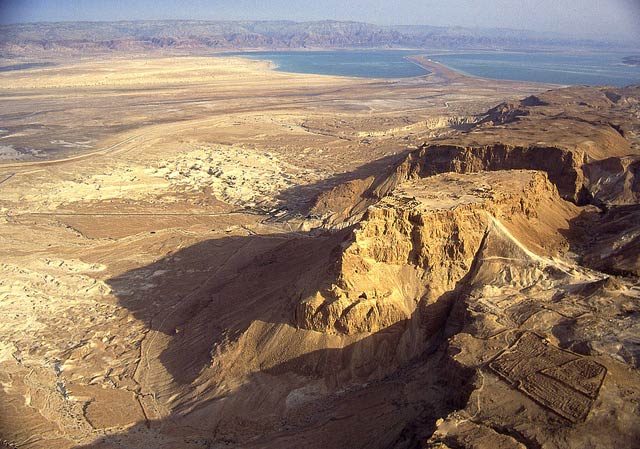By Avigayil Kadesh
It’s been almost a year since Lee Balot, 31, opened
The Green Backpackers -- a hiker-friendly, eco-friendly hostel-like lodge at the edge of the Mitzpeh Ramon natural crater in southern Israel.
“I was a tour guide and I worked in the hospitality industry, but the stuff I really like doing is talking to guests and explaining hikes and trails, which I didn’t have time to do in the hotels,” Balot says.
“I also saw that backpackers did not have a real answer for their needs in Mitzpeh Ramon. The only cheap places to sleep here are tents outdoors, and it gets very cold in the winter.”
Balot is on the cutting edge of a new niche in Israeli tourism focused specifically on backpackers -
- and on “flashpackers,” as Gal Mor, co-owner of Jerusalem’s new
Abraham Hostel, calls spontaneous travelers who book a flight and their first night’s accommodation, hoping to make personal connections to plan out the rest of the journey.

Backpackers exploring Jerusalem. Photo courtesy of Abraham Hostel
Backpack tourists might not even have an actual backpack. They are distinguished not by their choice of luggage but by their desire for interaction with other travelers and natives, independent travel and exploring new destinations. Many will come back and tour Israel in a more traditional way when they are older and economically well-off.
“Our core guests are backpackers mostly from Europe, the US and Australia, ages 25-35, and we enable them to meet and share information with the other guests in the common areas we provide,” says Mor, who has backpacked around Europe and Israel.
Mor’s business partner Maoz Inon says Israel offers backpackers many historic sites and beautiful landscapes within a relatively short distance from each other, making it a lot easier to navigate than in places like expansive South America, New Zealand or Australia. It also helps that Israel’s weather is predictable. Even in the rainy season, he says, backpacking in Israel is manageable.
“Israel is just a short flight from Western Europe, where most backpackers are coming from,” Maoz points out.

Israel’s network of youth hostels, like this one in Jerusalem, appeal to backpackers
Interacting with the locals
According to Mor, the main appeal of backpacking is the ability to interact with local people and local culture. “You are not on a bus with a homogenous group and a guide. You’re on your own. One of Israel’s most unique aspects is the different diverse cultures of Jews and Muslims, and as a backpacker you can choose to experience that alone or with an organized group.”
A website called
Backpacking Israel lists hundreds of trekking and hiking routes -- including the famous Israel Trail -- for backpackers, cyclists, adventurers and extreme-sports lovers.
Blogging backpacker Miriam Berger of
Travelling Starfish advises: “If you are looking for an inexpensive but satisfying backpacking adventure, you should look no further than the land of milk and honey. Israel is a backpackers’ dream. Not only is there so much to see without having to travel a far distance, you can do it quite cheaply in ways unique to this glorious country.”
To help their customers figure out what to see and how to get around, the Abraham Hostel -- named for the biblical forefather, “the first backpacker in the Middle East” -- has an information desk staffed seven days a week with expert backpackers.
“If you like archeology and hiking, for example, we can put together an itinerary for you,” says Mor. “And we offer daily free ‘Introduction to Travel in Israel’ lectures giving useful tools for somebody who’s just arrived.”
He says the iconic areas not to be missed include the Old City and Yad Vashem Holocaust Memorial in Jerusalem; the Dead Sea/Masada/Ein Gedi; Bethlehem; Tel Aviv-Jaffa; Haifa; and Eilat.

Israel offers backpackers both historical sites and
beautiful landscapes like Masada, near the Dead Sea
“More off the beaten track there’s
Nazareth, which is fascinating in religious and historic history -- a mixed city that enjoys a pleasant status quo, a vibrant market and a good central location for day trips to other parts of the Galilee. And there’s Acre [Acco], with its old port and market; the archeological park at Beit She’an; and the Golan Heights or Judean or Negev deserts, including Mitzpeh Ramon,” he suggests. Guests interested in culture and nightlife get recommendations for theater and walking tours.
“If our backpackers are into wildlife, we recommend visiting Hai-
Bar Yotvata Nature Reserve to see a good representation of the wildlife of Israel, or the
Jerusalem Biblical Zoo, especially if they have kids. For
bird-watchers, there’s the Hula Valley, depending on the season, and the Jerusalem Bird Observatory.”
Guest houses bridge backpackers and locals
Balot runs Green Backpackers in partnership with another experienced guide. They offer sunset tours of the crater, telescope tours of the night sky and arrangements for Bedouin hospitality.
“If they want hiking, we go inside the crater or in the area around it, or even in Sde Boker, 20 minutes away by bus, so we cover a pretty large area. Sometimes people go into the crater and camp out in it for a few days, so we lend them equipment. They can also go horseback riding, do ecological workshops or -- if they have a car -- visit the farms in the area and get tastes of homemade cheeses and wines.”
Their “base camp” features bunk accommodations, Wi-Fi, cooking facilities, gear rental and other services. And it’s environmentally friendly, as its name suggests.
“We thought about finding a large area and building with mud, but people told me the best ecological idea was to reuse an existing place. Eventually I saw a house that was right near my apartment, with a small elevator, and I knew it was meant to be.”
Even before its official opening, Green Backpackers had guests “sleeping on mattresses on the floor while we were painting the walls,” says Balot.
“We posted on hostel [Internet] sites and from the beginning we had people -- Germans, Canadians, Dutch, French, Japanese, Russians, Chinese and a few Israelis. Israelis have other places to sleep here and we try to give priority to backpackers from abroad.”
Balot just expanded to another apartment, adding three more rooms. “There are so many more backpackers now that we’ve had to send them to other hostels in Mitzpeh Ramon, and it’s gratifying to know we contributed to that,” she says.
She is working with the Ramat Negev Regional Council on a new map of the whole area, showing tourist attractions such as David Ben-Gurion’s grave in Sde Boker; the
Avdat National Park; bus routes and bicycle trails.
“People could stay here much longer if they have stuff to do,” says Balot, who hails from the Tel Aviv area but fell in love with Mitzpeh Ramon as a teenager.
Inon, who is also the entrepreneur behind the
Fauzi Azar Inn in the Old City of Nazareth and the nearby
Jesus Trail popular with Christian tourists, has backpacked around the world twice.
“I have traveled to some of the most beautiful places in the world, and I realized there is no match for the biblical lands in terms of the history and culture,” he says. “I saw a real potential for backpack tourism in Israel. It was completely undeveloped when I started in 2005.”
Inon got the notion for Fauzi Azar while in South America with his wife. “We learned that guesthouses can often bridge between backpackers and local communities by creating a venue for interaction,” he says. “We’re in the Old City, so our guests have the chance to interact daily with merchants and neighbors and local staff to get a better understanding of this old Arab city.”
Guests may help out at the reception desk, where they meet people from all over the world. They can participate in community projects such as cleaning the Jesus Trail, teaching English lessons and organizing special events such as the Flavor of Nazareth, where local restaurants contribute food for a tasting festival.
Independent-minded
Israel’s network of
youth hostels and kibbutz guest houses have always been appealing to backpackers. “For the backpacker, you are spoiled for choice when it comes to hostels in this country and all are safe and you’re welcomed with great hospitality,” writes Berger.
“There are so many unique opportunities in Israel to donate your time in exchange for accommodation and/or food. I’ve heard stories of many of my fellow travelers finding opportunities to help out on farms, homes and even wineries. The best part of this is that you don’t just get a place to lay your head; you also get to meet some new people who can tell you what living in Israel is all about.”
A new awareness of backpackers’ needs has led to even more. “When we started with Fauzi Azar in 2005, there was no infrastructure or facilities for backpackers,” says Inon. The inn has grown from three to 14 rooms.
“With a few others, we created that by encouraging more and more guest houses and
hostels to open dormitory facilities and give out printed maps and other information for independent travelers.”
This benefits not only the visitors but also the locals. “Tourism is about economic development, and staying in small kibbutzim, villages and towns is a great way to support and bring economic prosperity to the periphery,” says Inon. “Unlike mass tourism, here we really get a chance to support small business and local communities. We believe in it as a philosophy.”
This philosophy is paramount, he adds.
“Backpackers have changed over time,” Inon observes. “Now many of them are in a rented car and don’t have a backpack, but they’re still looking for interaction with other travelers and natives.
They’re still traveling independently, not in a group and not like traditional tourists. They want to explore new destinations, and we believe that Israel has huge potential for them as a new destination.”